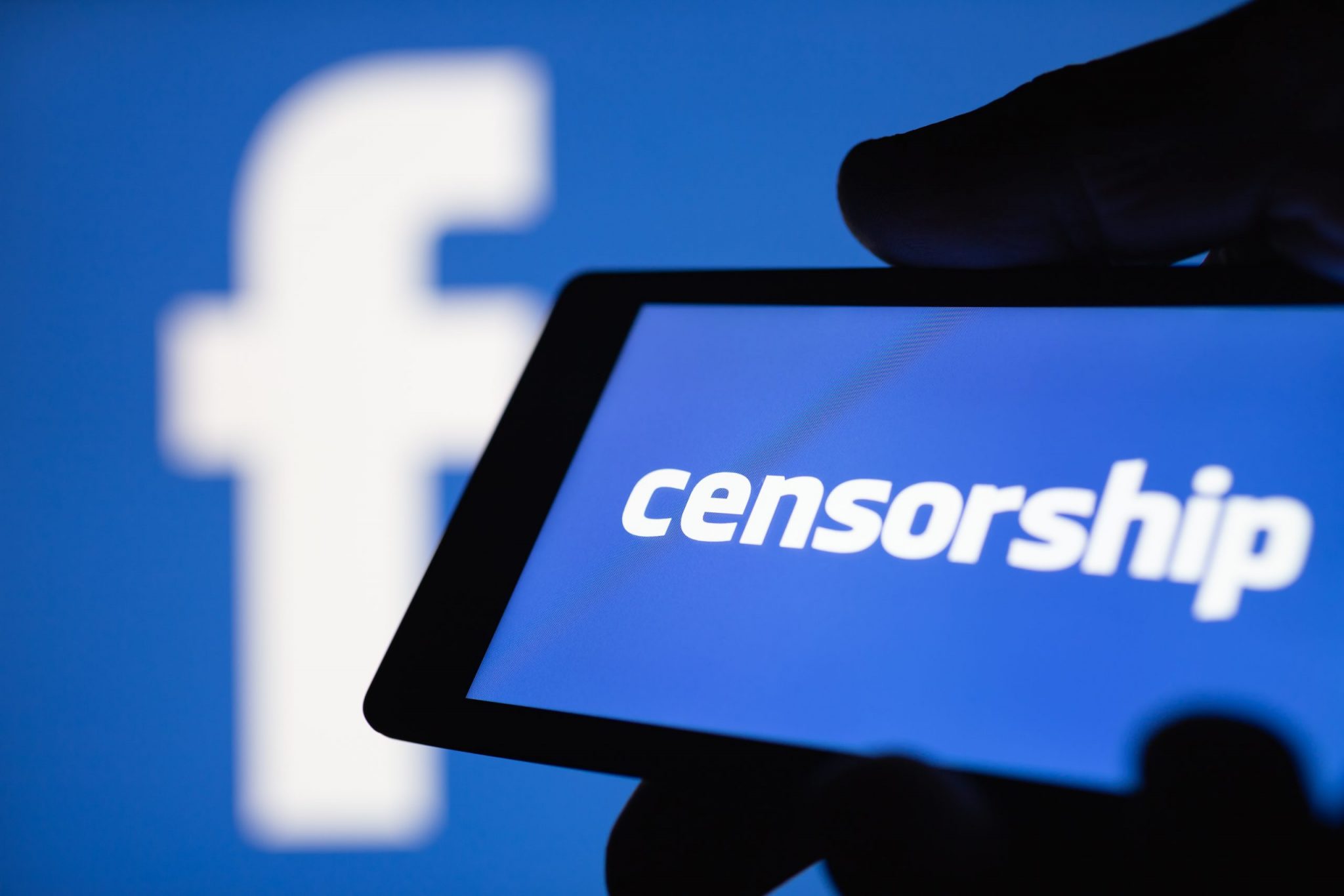Overview
Since the riot at the U.S. capitol on January 6, there has been a clear element of schadenfreude in Iranian, Russian, and Chinese state media coverage of political and social disunion in the United States. That adversarial state media outlets would use the chaos and ensuing fallout to cast the United States as unreliable and democracy as unattractive was predictable, if not inevitable. But beyond the usual tropes used to denigrate the United States in times of dysfunction, a prominent sub-theme that has emerged in their coverage is an intense focus on social media companies’ response to the attack, in particular the portrayal of Facebook and Twitter’s decision to ban Donald Trump as a slippery slope towards censorship. While it may seem incongruous for media outlets funded by countries that consistently rank among the world’s worst offenders in terms of upholding press and Internet freedoms to launch an anti-censorship crusade, it is not an unusual talking point—especially for RT. Irony aside, efforts by adversarial actors to amplify allegations of social media censorship highlight both the growing prominence of Big Tech as a U.S. wedge issue as well as authoritarian countries’ desire to dampen the appeal of a U.S.-led Internet.
By the Numbers
Between January 6 and January 20, Russian state media and diplomatic accounts were by far the most active of the three networks monitored on Hamilton in terms of pushing censorship and anti-Big Tech narratives. On Twitter, monitored Russian accounts used the word “censor” or “censorship” 105 times, “Twitter” 511 times, and “Facebook” 283 times. Although these hits included content unrelated to the riot, “Trump” was the hashtag and keyword most often associated with each query.
On Russia’s state-funded English-language websites, the same search parameters returned 49 results for “censor,” 44 for “big tech,” 38 for “free speech,” and 17 for “Silicon Valley.” (Again, a few of the top results for “censor” were unrelated to the riot and “free speech” returned several articles about Julian Assange.) That said, the results represent a roughly three-fold increase in uses of each term when compared to the two weeks prior to the Capitol riot.
Although Russian state-funded media’s promotion of anti-Big Tech narratives has escalated in the weeks after the riot at the Capitol, it is not new. RT has often positioned itself as an alternative to the “mainstream” media and other corporate interests. Its assault on U.S. social media companies also has been a consistent and persistent theme over the past few years. In 2020, for example, “censor” appeared in just under 400 English-language Russian state media titles or article excerpts. The top 10 key phrases associated with the word included “YouTube,” “Facebook,” “Google,” and “social media.” (Note: Twitter’s absence is likely a result of it not being extracted by Microsoft’s key phrase detection tool, as a cursory review of results showed it appeared often in censorship articles).
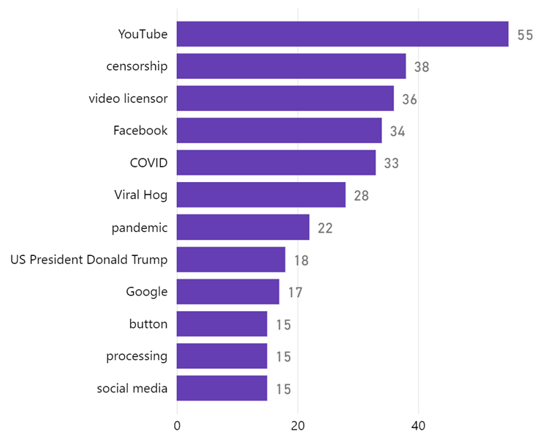
Top 10 key phrases associated with “censor” in article titles and excerpts published by Russia’s English-language state media outlets monitored on Hamilton 2.0 (January 1-December 31, 2020)
China and Iran provided significantly less coverage of censorship issues, both in the aftermath of the Capitol riot as well as over the course of the last year. In the past two weeks, Chinese diplomatic and state media accounts on Twitter used “censor” or “censorship” 5 times, “Twitter” 231 times, and “Facebook” 91 times. Iranian accounts used “censor” or “censorship” 4 times, “Twitter” 90 times, and “Facebook” 29 times. A review of Iranian and Chinese content associated with the word “censorship” found that most instances were not connected to the Capitol riot; however, the keyword most associated with “Facebook” and “Twitter” was “Trump,” suggesting there was an emphasis in those articles on riot-related coverage.
Last year, there were also significantly fewer articles about Big Tech censorship in both Chinese and Iranian state media websites compared to their Russian counterparts. In 2020, “censor” appeared in just 32 English-language Chinese state media article titles or excerpts. None of the top ten key phrases associated with the word referenced social media or Big Tech companies. Similarly, “censor” appeared in only 23 English-language Iranian state media article titles or excerpts. Facebook and YouTube were both among the top five words associated with “censor” in those articles.
What We’re Seeing on Hamilton 2.0
In the two weeks since pro-Trump supporters stormed the capitol, Russian state media outlets—RT in particular—have leaned into the debate over social media’s role in censoring political speech. While legitimate arguments over the companies’ decision to ban Trump from their platforms have been widely covered by U.S. and international media outlets, RT’s coverage has differed in two distinct ways.
First, RT has adopted the language and talking points of partisan right-wing (and, to some degree, left-wing) media personalities, alleging that the moves by the companies reveal their naked political bias as well as their craven pursuit of monopolistic power. These arguments have been elevated by RT’s stable of conservative opinion writers, including Wayne Dupree (whose Parler account was among the platform’s most-followed) and Micah Curtis, who previously suggested corrupt U.S. postal workers would rig the election in favor of Joe Biden.
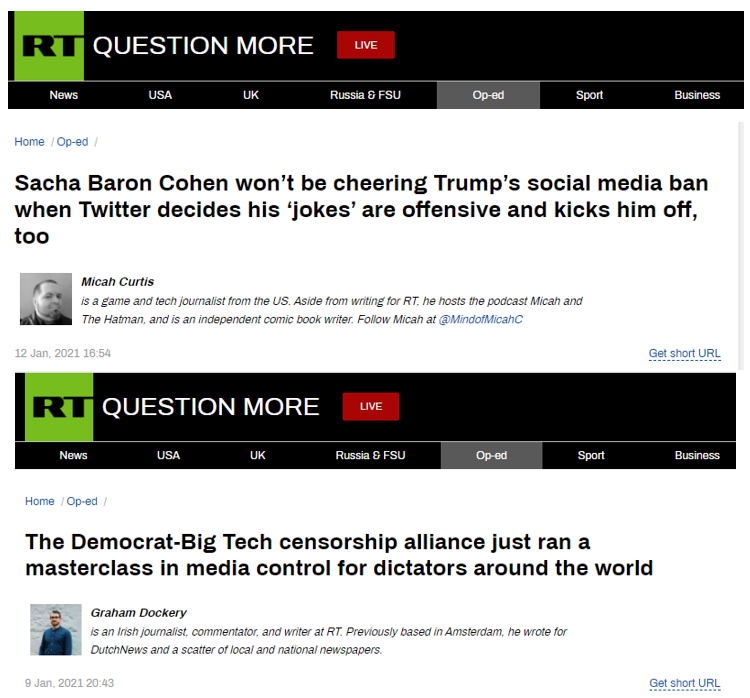
But RT has also found sympathetic voices to elevate among the anti-establishment left, including Glenn Greenwald and Redacted Tonight host Lee Camp. Claims that the temporary suspension of Trump’s account portend further purges of alternative viewpoints have also been widely circulated on Russian-government funded digital channels targeting the progressive left.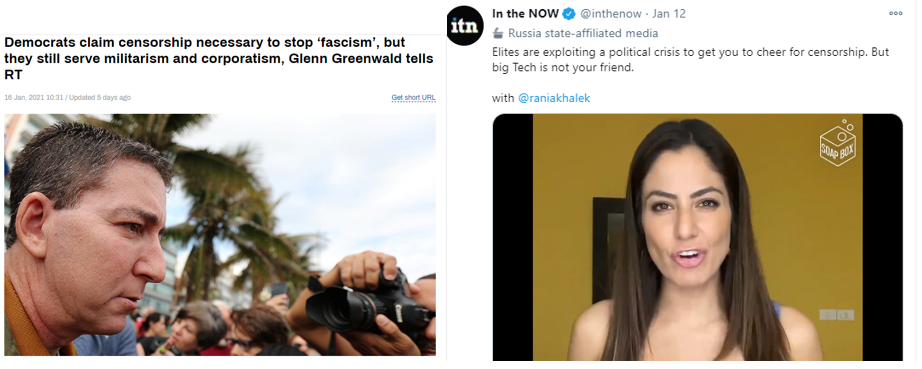
RT has also provided space for condemnations from the Russian political class, who, in 2019, voted overwhelmingly to allow state-run media watchdog Roskomnadzor to ban websites it determines publish “fake news.” This paradox was, unsurprisingly, not mentioned.
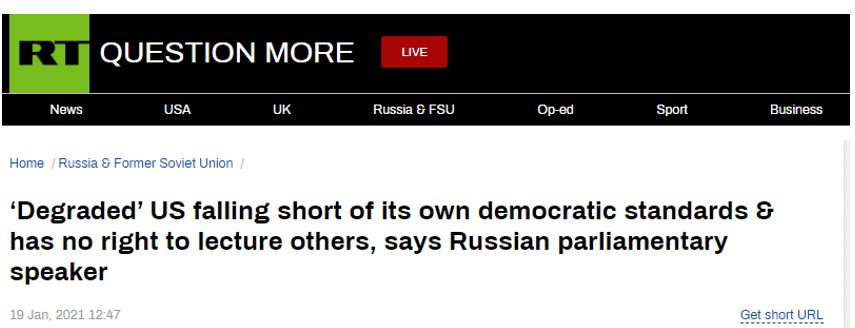
Beyond its more partisan and opinionated coverage of post-riot censorship issues, RT has also differed from other international media outlets in that it has adopted an almost activist approach to publicizing alternative social media channels. This has been accomplished through extensive coverage and de-facto promotion of Parler, Telegram, and other alternative platforms, which are described as havens of free speech for those escaping Silicon Valley’s “purge.”
RT’s efforts to drive Americans from major social media platforms to the less moderated corners of the Internet has not only been attempted through editorial choices. For the past several days, RT.com’s homepage has carried a banner with the hashtag #LeaveTwitterJoinTelegram, directing its readers to “find freedom” by joining RT’s Telegram channel. This overt promotion of one privately-owned company over another is unusual, to put it mildly, for a media outlet.

Screenshot images of a scrolling banner on RT.com’s homepage directing readers to its Telegram channel.
Chinese Censorship Narratives
In the aftermath of the riot at the capitol, Chinese outlets and their influential editors (whose Twitter accounts are often sources for their more bare-knuckled messaging) primarily focused on hypocrisy narratives—namely, that protestors in Hong Kong should be treated with the same disdain as rioters in Washington, D.C. This theme also received substantial play among China’s diplomatic corps. Although censorship and Big Tech narratives received substantially less coverage than in Russian circles, they were peppered throughout their post-riot reporting.
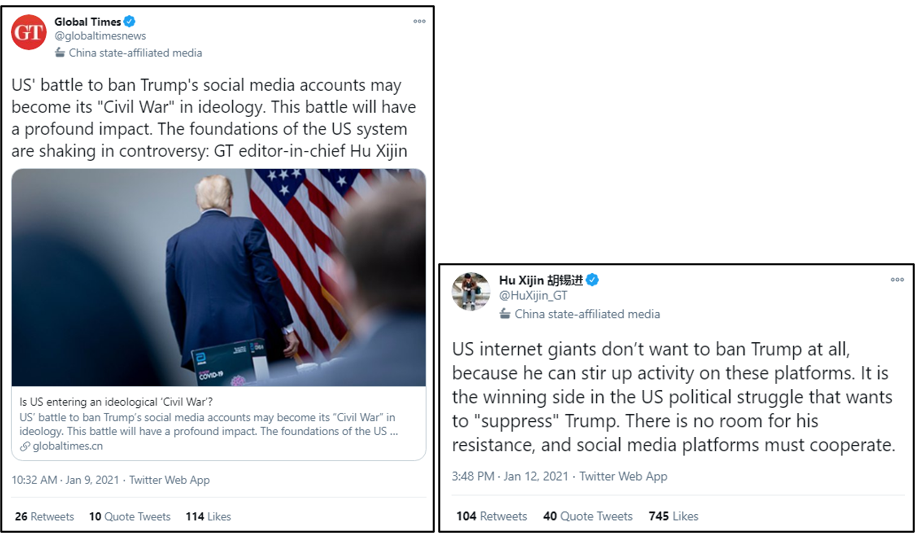
While some of the themes echoed those promoted by Russia, there was, as per usual, a less nuanced approach to tapping into genuine domestic grievances in the United States. Instead, the focus was more on censorship as evidence of the decline of the “U.S. system.” There was also a more transparent effort to denigrate the “U.S. digital hegemony,” which of course directly threatens China’s online business interests.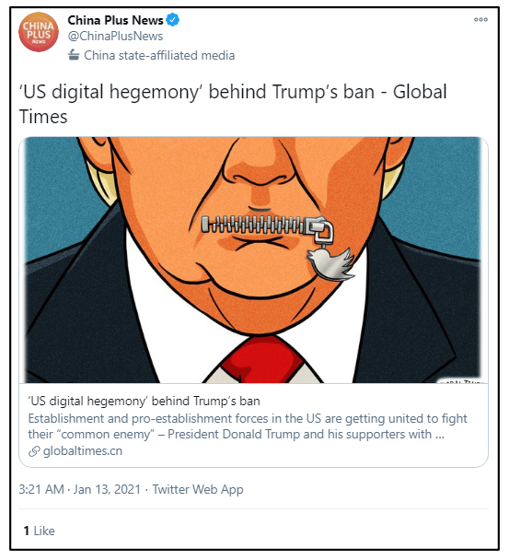
Iranian Censorship Narratives
Iran’s state media outlets and government officials provided the least amount of coverage of Silicon Valley’s Trump ban, instead focusing, at times gleefully, on the disreputable end to Trump’s presidency and, unrelatedly, the supposed end of liberal democracy. The coverage that was provided of Big Tech’s crackdown was largely factual and free of editorial spin, with a few notable exceptions.
A Fars News article trumpeted Russian Foreign Minister Sergei Lavrov’s claim that owners of U.S. tech companies “don’t care a bit about the constitutions of their nations.” Putting aside the obvious misinterpretation of how free speech pertains to private companies in the United States, the amplification of Russian talking points is a recurring theme in Iranian messaging. Another article also seemed to echo a favored Russian narrative by accusing Democrats of using the unrest to crackdown on dissent. The use of a jilted former U.S. official to make that claim is also a page from the Russian book.
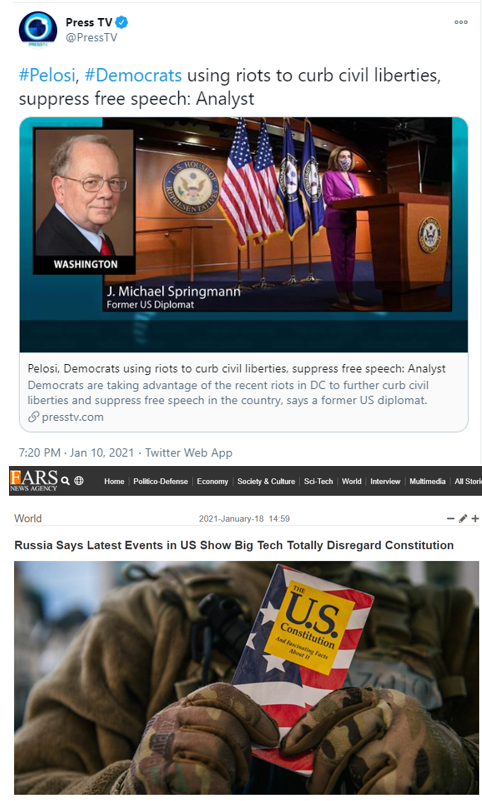
Why It Matters
While the individual journalists and pundits advancing anti-censorship arguments for Russian, Chinese, and Iranian state-controlled media outlets may genuinely support free expression, it bears repeating that the governments that finance those outlets do not. The editorial decision to dedicate space to missives about the threat Big Tech poses to free speech should therefore be understood through a more cynical lens. China, for example, is in a pitched battle with the United States to control the Internet. By promoting a narrative that Silicon Valley’s hegemony is a threat to global speech, it can better position its own brands as viable alternatives. Russia, too, has an economic and geopolitical interest in damaging the fortunes of some of the United States’ most profitable companies. But it is perhaps more interested in the promotion of censorship and political bias narratives as yet another culture war issue that can be used to pit Americans against each other. Going forward, social media may therefore become not only the staging ground for foreign information operations but also a target of them.
Amber Frankland, Nathan Kohlenberg, and Etienne Soula contributed research to this report. The views expressed in GMF publications and commentary are the views of the author alone.

